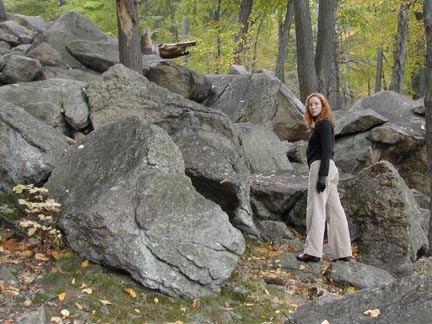Point of View: Lightsey Darst
Lightsey Darst will produce What Light: This Weeks Poem." Were delighted to be able to offer this feature with the help of Magers and Quinn, a bookstore whose championing of writers makes it a great destination for readers.

“What Light: This Week’s Poem” will feature one poem every week on mnartists.org, readings by featured poets and Magers and Quinn Books in Minneapolis, and eventually a book collecting the poems that run on the site. The series will be selected by jurors every 3 months, and will be directed by Lightsey Darst.
Darst is a poet, a critic, and a dancer. She was a Minnesota State Arts Board Fellow in poetry. She currently writes on dance, art, and literature for mnartists.org and other venues, and has published her poetry widely.
Tell us about yourself—and about how you came to think of yourself as a writer.
I was born and raised in Tallahassee, Florida. I was home schooled for a while, then I went to a strange little school without grades or assignments (I remember that we made books out of cardboard, burlap, and construction paper, and ran around in the woods), and then finally, when I was twelve, I went to the horror that is public middle school. I graduated from a good high school, for which I’m now very grateful, got my BA in English literature at Florida State University, and then came up to Minnesota for my MFA in poetry.
I realized that writing meant something to me in my junior year of college, when I went to London for a study abroad program and found myself taking notes for and typing up a massive journal. I couldn’t have articulated it this way then, but I needed to write to remember, to revisit, to build significance around my experiences. I didn’t write poetry, fiction, or anything in particular at the time (though I often wrote), but I knew that I should give writing a try.
What is for you the most important aspect of a writing project, and why?
The most important element is need. I have to feel that the writing needs to exist—and not just for my vanity or ambition. I don’t mean that the writing has a message, that I write didactically, or anything like that; I don’t mean that the writing is a cure for something in particular, or that it’s even a cure. The need is more mysterious and less defined than that. But it has to be there for me to want to write.
What’s your favorite place in the world?
This shouldn’t be an easy question, but it is. When I was a child, my family went to Highlands, in the mountains of western North Carolina, every fall for a week. (In fact, until I was twelve, Highlands was the farthest from Tallahassee I’d ever been.) We went to stay in my great-uncle’s vacation house, see the fall color, hike, and so on, but for me this wasn’t just a vacation. I instinctively loved the area—it’s beautiful, at once wild and full of human history—and so every moment of each trip was precious to me in a way that ordinary life wasn’t. I remembered North Carolina through the year, and then each October when we drove up again the memories became deeper. Not everything that happened in North Carolina was pleasant; I was still a child, and I still got in trouble with my parents and fought with my brother. But even these things became magical (darkly, maybe) over time. This building and layering of memories was accidental or instinctive at first, but later I did it deliberately, staring out my window at the red maple tree and trying to remember every detail of it and what it was to me. In Highlands I first felt for significance, for weight and attachment in my life.
How culturally bound do you think poetry is? That is, is
poetic communication necessarily culture- or place-specific?
I’m teaching a class on Neruda now, and I keep shooting myself in the foot by reminding my students that we can’t really access the true Neruda without reading Spanish—and even then we’ll be missing the cultural context. All this is true, clearly, and yet I’m a believer in things we can’t understand. What I get from the Venus of Willendorf (to use an example from visual art) is perhaps not what the creator thought of, but something comes across. “What I get” is a very crude way to talk about what’s happening, and it misses the point: if art only rendered up something to its viewer, then those outside its original context would certainly be getting a garbled or irrelevant reading. But I think art creates a less easily defined communion. Pace Frost, poetry is not lost in translation. If it were, it wouldn’t be poetry.
Can we read one of your poems?
When I saw Crystal Gale sing
she greeted the scattered bits of her heart
like a martyr revisiting her torn-up body on earth in
a thousand broken reliquaries
her mountain voice flowing out of my grandmother’s living
room TV / she was a tiny woman with mile-long hair
and she swung her rope / when I was little it all was
a mystery / The black figure without a heart, I
kept climbing the melted stairs in dreams—hung above
my body as I lay, prone, praying / black wheel
of its belly, in which
hidden: bodies of my future
There were children tossing unalive in there
But tell me the numinous body
in her halo, voice, cloak of hair was not a deception
was she hung before you also, the promise
you would become
sadness / tell me whether it spun, suspended
or projection / whether it bound you in or sprung free?